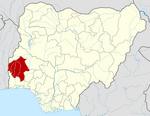Kisi, Oyo
This article needs additional citations for verification. (February 2012) |
Kisi | |
|---|---|
town | |
| Country | |
| State | Oyo State |
| Government | |
| • Iba of Kisi. | Engr. Oba Moshood Oyekola Lawal Arowoduye 11 |
| Time zone | UTC+1 (WAT) |
Kisi (or Kishi) is a large town in Oyo State, Nigeria. It is the headquarters of the Irepo Local Government Area. Kisi or otherwise called Kishi is currently located at the northern part of Oyo state and it the headquarters of Irepo local government. Kisi is an extension of old Oyo-Ile which was collapsed in the 18th century as a result of Jihad activity by the Hausa/Fulani of Ilorin, Kwara state. Kisi is about two hundred and fifty kilometers from Ibadan, the capital city of Oyo state and it is about one hundred and fifty kilometers from Oyo Alafin.
The town has an official Post Office.[1]
Kisi: Historical antecedent
Historically, different tribes such as Baruba, Yoruba, Fulani had been in existence in Kisi since 13th century. According to some oral traditions, the first inhabitant in a place called "Igbo-Ifa" was "Kilisi Yeruma", an Ibaruba man. Subsequently, two Yorubas joined "Kilisi Yeruma" and they ardently supported him in the formation of the town. Later on, the place (i.e. Igbo-Ifa) was changed to "Kilisi", the name of the first inhabitant. After omission of two letters i.e. l and i, it remains Kisi. This is derivative origin of the town's name. However, the corrupt version of the town's name is otherwise called Kishi which is still revolving round the original name. Today the name is either written as Kisi or Kishi.
Economic Activity of the People of Kisi
The progress and development of a particular village, town, city, state or nation depends on the total amount of commitment to economic expansion and development. Rahim Sulayman (2000) has extensively found out that the main occupation of Kisi people is farming. The economic progress is determined by the farm produce. The major farm produce are: Yam, maize, guinea-corn etc. The blacksmiths also play a key role because they produce hoes, cutlass and other farm equipment. The farm produces are export to other cities like Ilorin, the capital city of Kwara State, Ibah the capital city of Oyo state etc. Today, the town for his strong commitment to economic advancement of Oyo state Generally, it is known as the "Food Basket of Oyo State".
Social Organizations in Kisi
This section is empty. You can help by adding to it. (September 2011) |
Religions in Kisi
Recently, in a research conducted by Ahmad Tijani Surajudeen and Muhammad Zahiri (2011), it has been shown that in Kisi, just like any other part of Yoruba land specifically and Nigeria generally, there are three predominant religions namely: traditional, Christianity and Islam. The traditional religion from Oyo-Ile in 1820 reached the town. The traditionalists celebrate various festivals such as: Eegungun, Sango, Iyemaja etc. Through Joseph Ladipo in 1910, Christianity got to the town. The first place of worship was First Baptist Church, located at Ajegunle Area, Kisi. Subsequently, the second place of worship was constructed in the year 1950.
Islam, the third religion in the town, reached Kisi through a popular Oloyoyo family in the year 1868. Later on, Teefa's family was influenced by Oloyoyo's family. Both families devotedly propagated Islam in the town and its environs. The area where Oloyoyo's family resides is called Isale -Imole. Isale Imole has two meanings. The first meaning is that an area where religion of Mali came from. The reason for this meaning is because of direct link of West African Islam with Timbuktu, Mali. The second meaning is that, Imole is from Imo-lile i.e. difficult knowledge. Islamic knowledge is considered difficult because of its Arabic inscription in understanding the Qur'an.
More so, the arrival of an Islamic scholar, Abdullah bn al-Malik in 1894 was significant in the historicity of Islam in Kisi. This scholar, influenced the conversation of the then king, Adewale Ariwajoye, to Islam which has positive influence on the citizens' acceptance to Islam. Islam has been well grounded in the town today and the Muslims are majority in the town.
References
- Rahim Sulayman (2000). Kisi in map.
- Ahmad TIjani Surajudeen and Muhammad Zahiri (2011). Islam and Islamic Education: The role of Muslim scholars and establishment of Madrasah in Kisi Nigeria.
- Olaniyi, M.F.(1982). Iwe itan Ilu Kisi lati Odun 1300-1900 (Historical treatise of Kisi from 1300-1900). Rashid press: Kisi.
- Egbe Odo Musulumi (1998). Iwe itan Islam ni Ilu Kisi. NACOMYO Kisi Branch. Kewulere press, Ilorin.
- Notes
- ^ "Post Offices- with map of LGA". NIPOST. Retrieved 2009-10-20.

